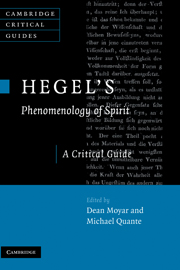Book contents
- Frontmatter
- Contents
- Notes on the contributors
- Preface
- List of abbreviations and citations
- Chapter 1 Substance, subject, system: the justification of science in Hegel's Phenomenology of Spirit
- Chapter 2 “Science of the phenomenology of spirit”: Hegel's program and its implementation
- Chapter 3 The Phenomenology of Spirit as a “transcendentalistic” argument for a monistic ontology
- Chapter 4 Sense-certainty and the “this-such”
- Chapter 5 From desire to recognition: Hegel's account of human sociality
- Chapter 6 “Reason … apprehended irrationally”: Hegel's critique of Observing Reason
- Chapter 7 What is a “shape of spirit”?
- Chapter 8 Ethical life, morality, and the role of spirit in the Phenomenology of Spirit
- Chapter 9 Self-completing alienation: Hegel's argument for transparent conditions of free agency
- Chapter 10 Practical reason and spirit in Hegel's Phenomenology of spirit
- Chapter 11 Religion and demythologization in Hegel's Phenomenology of Spirit
- Chapter 12 The “logic of experience” as “absolute knowledge” in Hegel's Phenomenology of Spirit
- Bibliography
- Index
Chapter 7 - What is a “shape of spirit”?
Published online by Cambridge University Press: 22 September 2009
- Frontmatter
- Contents
- Notes on the contributors
- Preface
- List of abbreviations and citations
- Chapter 1 Substance, subject, system: the justification of science in Hegel's Phenomenology of Spirit
- Chapter 2 “Science of the phenomenology of spirit”: Hegel's program and its implementation
- Chapter 3 The Phenomenology of Spirit as a “transcendentalistic” argument for a monistic ontology
- Chapter 4 Sense-certainty and the “this-such”
- Chapter 5 From desire to recognition: Hegel's account of human sociality
- Chapter 6 “Reason … apprehended irrationally”: Hegel's critique of Observing Reason
- Chapter 7 What is a “shape of spirit”?
- Chapter 8 Ethical life, morality, and the role of spirit in the Phenomenology of Spirit
- Chapter 9 Self-completing alienation: Hegel's argument for transparent conditions of free agency
- Chapter 10 Practical reason and spirit in Hegel's Phenomenology of spirit
- Chapter 11 Religion and demythologization in Hegel's Phenomenology of Spirit
- Chapter 12 The “logic of experience” as “absolute knowledge” in Hegel's Phenomenology of Spirit
- Bibliography
- Index
Summary
Spirit is the ethical life of a people insofar as it is the immediate truth: The individual who is a world. It must advance to a consciousness about what it immediately is, must sublate that beautiful ethical life, and, by passing through of a series of shapes, attain a knowledge of itself. These distinguish themselves, however, from the preceding in that they are real spirits, genuine actualities, and, instead of being shapes only of consciousness, they are shapes of a world.
(239, ¶440)The term itself, “shape of spirit,” occurs rarely in Hegel's pre-Phenomenology writings, where he instead preferred to speak of a “form of life.” It was in fact in the development of his ideas in Jena that the phrase “shapes of spirit” came to replace “forms of life,” even if the latter phrase never fully disappeared from his writings. The dominant distinction in the Phenomenology, though, is that between “shapes of consciousness” and “shapes of spirit.”
In one sense a “shape of consciousness” is relatively easy to characterize. It involves the way in which an individual is conscious of the natural world around him, how he represents that world to himself, how he represents himself to himself and to others and how he represents others to himself.
- Type
- Chapter
- Information
- Hegel's Phenomenology of SpiritA Critical Guide, pp. 112 - 129Publisher: Cambridge University PressPrint publication year: 2008
- 10
- Cited by



